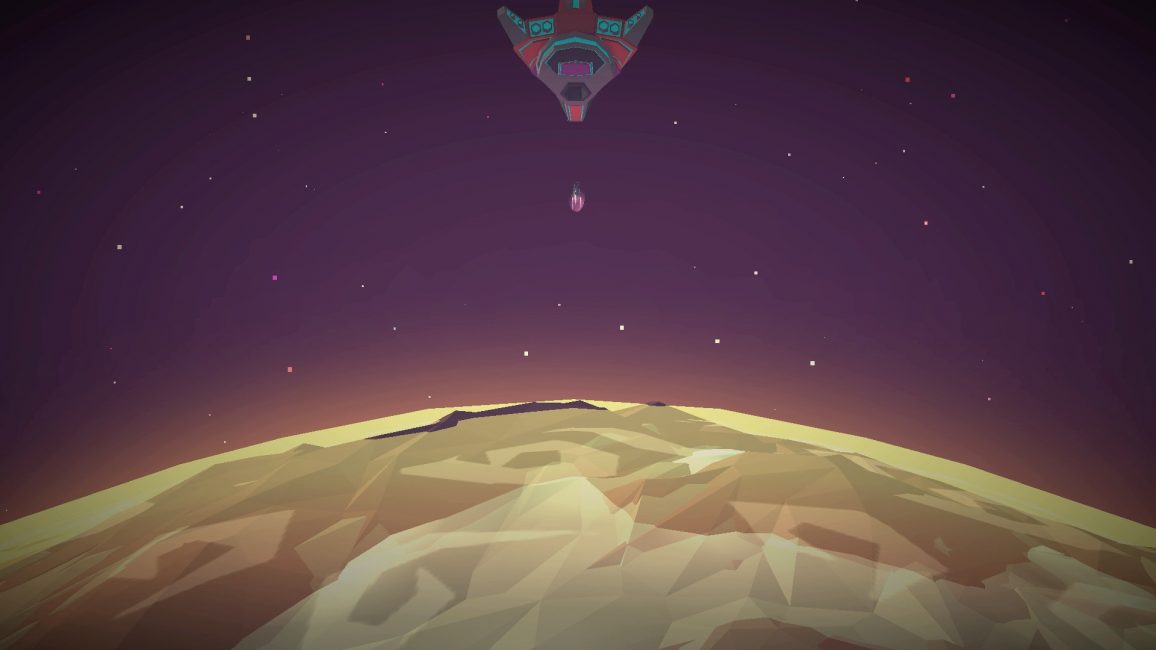Developer: Crescent Moon Games
Publisher: Crescent Moon Games
Reviewed on: Switch
Code Received.
Morphite wears its inspirations on its sleeve. One part Metroid Prime, one part No Man’s Sky; you’ll be trekking back and forth across the galaxy on a quest to discover the secrets of the mysterious substance known as Morphite. The best part of Morphite is the exploration, as there’s a seemingly unlimited supply of planets to explore. However, the mere act of getting around is a detriment to the experience. Over coming the clunky controls may not be easy, but the payoff is a satisfying adventure through an exciting, stylized world full of secrets.
The first thing you’ll notice when starting up Morphite is the unique visual style. Plain polygonal character and environments fill the screen. However, the amount of milage the developers get out of this simple art style is impressive. All the planets have unique color pallets, varied flora, and are inhabited by a myriad of wildlife, making each one exciting. One of the key components of the game is scanning animals and plants on each planet. Selling these scans is your primary way to each chunks, the in-game currency. It’s here where some of the control issues begin to creep up. When you first start, your scanner has a very short range and you easily scare away any creature you approach. This makes scanning difficult, especially for smaller creatures who already have a tiny “hit box” you need to scan. While later upgrades make scanning easier, it’s never quite as satisfying as it should be for something so integral to the game.

You can use the chunks you acquire to purchase upgrades to your ship, weapons, and suit. Much like Metroid Prime, these upgrades include increase ammo reserves, armor enhancements that allow you explore inhospitable climates, and larger fuel tanks for your ship. The major upgrades like new weapons and abilities are discovered on planets during the main story quest. You’ll find bombs, a missile launcher, and even a robotic dog with a laser turret. There is enough variety in the upgrades and items to keep me guessing what I was going to find next.
What really separates Morphite apart is it’s massive galaxy that you can freely explore. There are dozens, if not hundreds, of systems to fly to, each with at least one planet to explore and a space station. While the space stations are all fairly similar, some of them have mini-games you can play like a shooting range or fake arcade cabinets. The planets, however, have more variety. You’ll see swamps, ocean worlds, barren plains, junk yards, and forests. Unlike No Man’s Sky, however, each plants only has a small area to explore, typically with a new species to scan and maybe a side quest to complete. The worlds you go to during the main quest are slightly larger, however, and offer secrets and puzzles to solve.
There’s little variety to puzzles, as they mostly consist of shooting a power node to active a switch or finding the right weapon type to shoot a door. They do mix things up by cleverly hiding power nodes and teasing you with a door you can’t open yet. You’ll also fight a number of boss battles, which aren’t difficult from a design perspective, but can be frustrating do to the game’s controls.
Which brings us to the real problem of Morphite. The basic movement and aiming is very imprecise. For a game focused around platforming and shooting, it can sometimes be borderline infuriating. While I did get accustomed to some of the game’s control quirks, it never truly feels responsive. Trying to hit a tiny power node often resulted in several misses simply because the analog sticks didn’t offer the precision needed to hit my mark. This was also the case with jumping. I missed many jumps because my character wouldn’t jump when I pressed the button. Or sometimes I had to jump first then push the analog stick in the direction I wanted to do it. These issues add up when the results are wasting your limited ammo or even death.

Morphite‘s story is also a mixed bag. I was generally interested to discover the mysteries of Morphite, a powerful exotic material thought to be extinct. The main issues I had with the main quest was its insistence on back tracking. It never brings you to the same planet twice, but it does make you slog back and forth to your base. The early portions of the quest are slow crawls from system to system because you can only get so far before you have to refuel at a space station. It gets less tedious once you upgrade your fuel reserves, but you’re still forced to watch the same space flight animation over and over. All in all however, the main quest line is satisfying and features from truly excellent voice work.
To Dock or Not to Dock?
Like most Switch games, Morphite runs at a higher resolution when docked as opposed to 720p when undocked. This definitely results in a lower framerate when playing docked. Undocked, the game ran at a more stable, consistent framerate. Because of the swimmy nature of the controls, the inconsistent docked framerate made me feel slightly nauseous a few times.
In the end, it’s hard to complain too much about Morphite‘s short comings. It truly nails the wonder of the original Metroid Prime, while also allowing you to explore a vast galaxy. Many of the control issues can be overcome with patience and the upgrades you pick up alleviate some of the game’s early problems. The lower docked framerate is probably the hardest thing to overlook. All in all, it’s ambitious in all the right places and doesn’t bite off more than it can chew.








